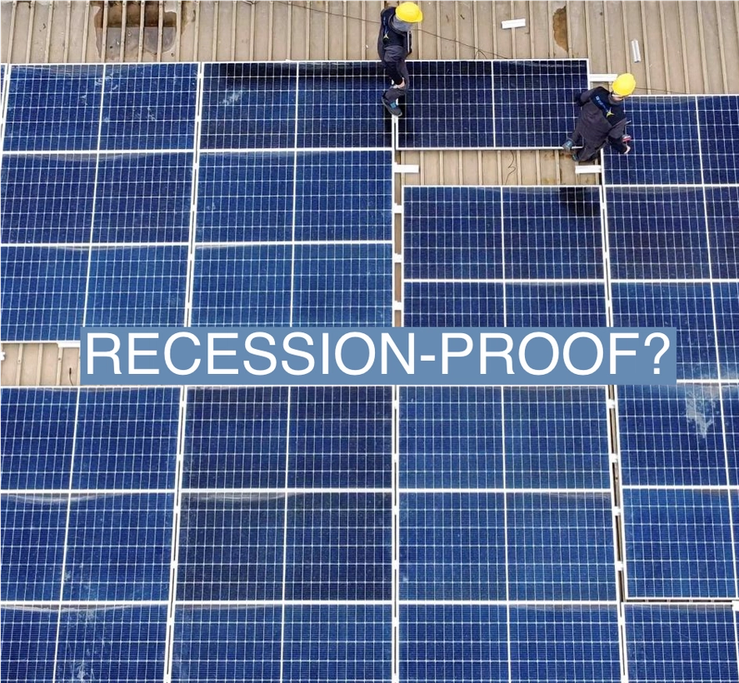The News
A deal to raise the debt ceiling inched closer after the latest talks between U.S. President Joe Biden and House of Representatives Speaker Kevin McCarthy as the government tries to avert a potential financial crisis. McCarthy said that an agreement could be reached by the end of this week with both sides taking “default off the table.” Without a deal, the U.S. could default on its $31.4 trillion debt as early as June 1, and negotiators remain far apart on the key question of whether Republicans will accept a deal that doesn’t come with deep cuts to federal spending.
Tim’s view
Even if a default is avoided, a recession is still looming, setting up a test of how well the Inflation Reduction Act can shield the clean energy industry from economic headwinds.
In the event of a recession, companies may slow hiring, exacerbating the shortage of wind turbine technicians and other clean energy workers that is already a roadblock for many firms. Businesses of all kinds will be slower to sign new clean energy purchase agreements, which reached a record in the U.S. last year. Venture capital to scale climate tech startups out of the lab might dry up. Lower consumer spending could also push down oil prices, further undermining the competitiveness of electric vehicles.
In the more extreme case of a default, interest rates would rise, choking off financing for clean energy projects that typically have high upfront costs, are financed by debt, and take years to turn a profit. Utility-scale solar and onshore wind projects, which are today the cheapest forms of electricity generation to build in the U.S., could no longer be cost-competitive with fossil fuels, which are less reliant on borrowing. Riskier emerging technologies like green hydrogen, meanwhile, may not get the financing they need to prove they work.
In this scenario, the government may be forced to cut its clean energy spending, for example, by putting a freeze on tax credits or holding back unallocated grant and loan money. The White House would likely do its best to prioritize this funding (and to keep it off the table in any debt ceiling deal), given how important the Inflation Reduction Act is to Biden. But if Treasury Department workers get furloughed, they can’t process IRA tax credits.
In any case, the IRA should act as a kind of recessionary prophylaxis for the industry. The Energy Department, for example, has more than $400 billion in loans available precisely for clean energy ventures that get frozen out of the private credit market. With that kind of backstop, a recession could slow the energy transition, without scuppering it.
“When it comes to fighting a recession, the federal government typically can never quite get its act together to get stimulus to the right place at the right time,” said Ellen Hughes-Cromwick, a former government chief economist and a senior climate fellow at the think tank Third Way. “But we lucked out with this effort on clean energy [the IRA] that comes at a time when it will really help to tamp down those recessionary forces.”
Quotable
“The U.S. teetering on the brink of default means that more power goes to countries like China that have a somewhat more stable outlook. In a zero-sum view of the global clean energy race, other countries are smiling about what’s happening in D.C. This is a self-inflicted wound, and goes counter to the drive for green industrial policy that emphasizes domestic investment.” — Gernot Wagner, climate economist at Columbia Business School
Room for Disagreement
A recession could also provide a boost for decarbonization — if it makes IRA funding more attractive to Republican-led states like Texas that have pushed to hobble the adoption of renewables. It could make energy efficiency upgrades for homes and industrial facilities look more worthwhile too, in the interest of cutting bills. And if a recession brings down the projected trillion-dollar cost of implementing the IRA, that could reduce the risk that Republicans try to gut it altogether.
The View From Uppsala, Sweden
One trend to watch for during a recession is mergers and acquisitions. Big clean energy firms could find opportunities to snap up smaller rivals that can’t afford the capital to continue on their own. This week the Arizona-based solar panel manufacturer First Solar acquired Swedish solar component firm Evolar for $80 million.
Notable
- Lower use of IRA clean-energy subsidies in the U.S. because of a recession would also slow down the global transition. As the industry scales in the U.S., it should make clean energy tech less expensive everywhere. A February paper by economists at Yale and Columbia universities projected that the global average cost of capital for renewable energy projects will be 7% lower by 2030 than it would be without the IRA.


